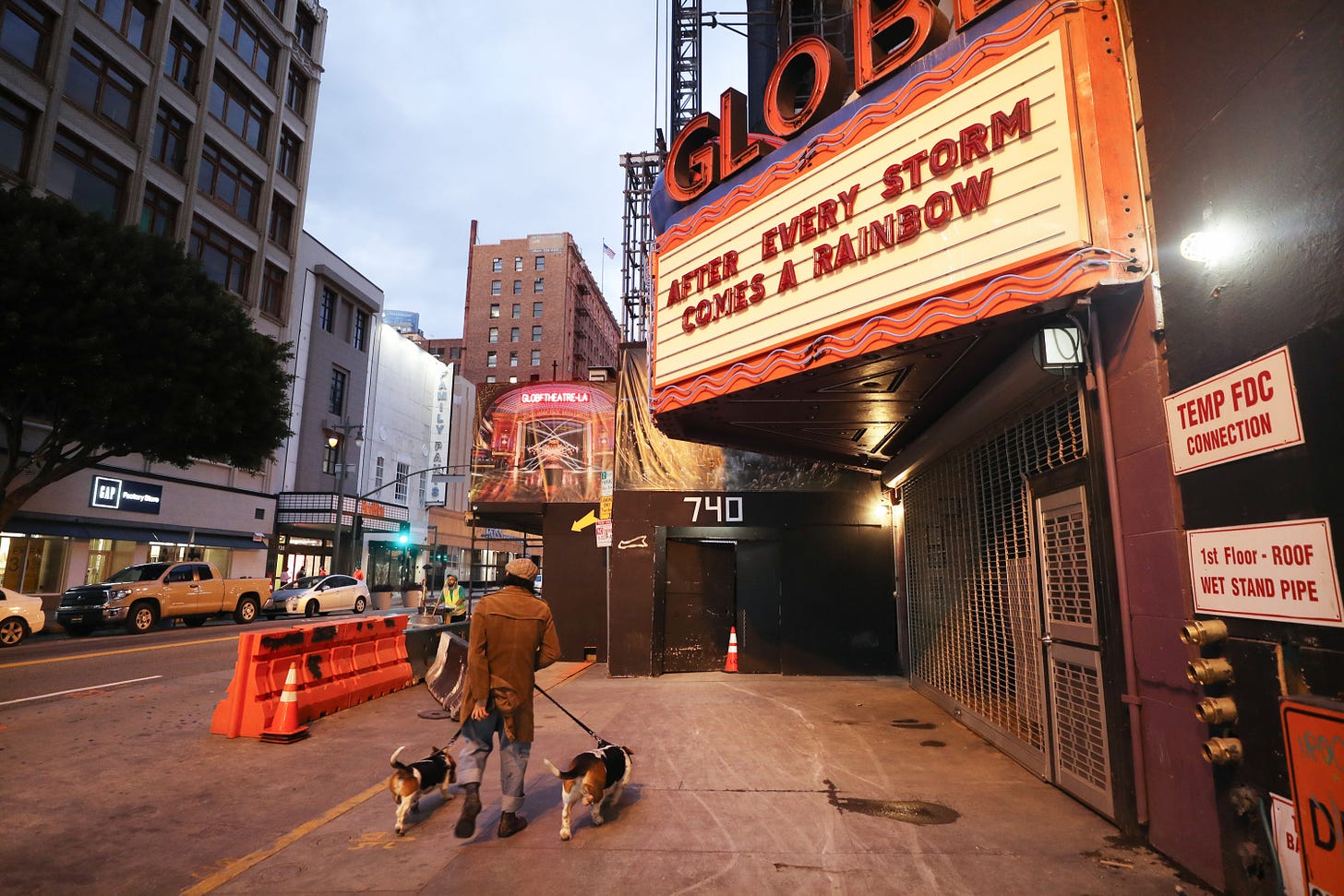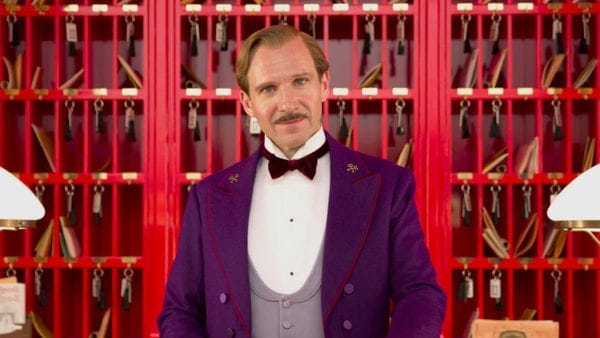
JVL, at the beginning of this week, asked me to write about Zack Snyder’s version of Justice League, affectionately known as The Snyder Cut in cultured corners of the web. And I was happy to do just that—did you know the great man himself unveiled Superman’s black costume in footage for fans this weekend? DID YOU?—until, sadly, fate intervened and AMC decided to blow up the exhibition business.
Here’s the short-ish version of what has transpired over the last four months. In the before-time, the long-long-ago, films had a 90-day (or so) window of exclusivity in theaters. Obviously, the coronavirus has changed that. A handful of films (The Hunt, Bloodshot, The Invisible Man, and a few others) that had opened in the weekends preceding the virus’s closure of all theaters broke that 90-day window with the grudging consent of exhibitors. Most films that hadn’t been released yet—from big tentpoles like Black Widow and Tenet to indie features like A24’s First Cow—were pushed back on the release schedule.
Universal chose not to push back Trolls: World Tour, releasing it instead on PVOD (Premium Video on Demand). The film did pretty well, grossing less overall than it might have in a domestic theatrical run but earning Universal about the same amount of money due to better revenue splits on VOD sales. So Universal took a victory lap, suggesting that some films in its library would now debut on PVOD sooner than the 90-day window.
AMC . . . did not appreciate this.
In a blistering denunciation, the world’s biggest theater chain announced it was blackballing all Universal movies, and not just those that broke the 90-day window. Notably, the rest of the big theater chains did not back AMC’s play here, saying they would forgo exhibiting only those films that broke the 90-day widow.
And then, because theaters have been closed for so long, nothing happened for a while.
Which brings us to this week, when AMC announced it had struck a deal with Universal: In exchange for an undisclosed cut of the PVOD revenue, AMC was shortening the window of theatrical exclusivity to just 17 days/three weekends. Meaning that, after three weekends of play in theaters, Universal could offer its films on Premium VOD.
To my mind, there are three big questions about what this move means.
Question One: What do the rest of the theater chains do?
This deal is between AMC and Universal only, meaning that Universal is going to have to strike similar deals with the other major chains. And the other major chains are looking at this and, more or less, saying “wtf guys?” Cineworld—which owns America’s second-biggest theater chain, Regal—said they “see this as a wrong move at the wrong time. Clearly we are not changing our policy with regards to showing only movies that are respecting the theatrical window.” Does this mean that now it’s Regal’s turn to say they won’t be showing any Universal movies, period? Will they pick and choose what they decide to show? What will smaller chains like Alamo and Angelika and Arclight do?
Question Two: What do the rest of the studios do?
The other studios obviously cannot allow this sort of advantage to accrue to Universal without getting something in return. Does Warner Bros. demand a similar flexibility? Does Disney—which dominates domestic box office—revolt, worried that shortening windows damages its stranglehold on the family film market? Do they decide to boycott AMC and go exclusively with Regal and Cinemark and the rest?
Question Three: What do audiences do?
What audiences do when they know they can just wait a couple of weeks to watch something at home is the hardest question to answer here. Smarter people than I, including CNN’s Frank Pallotta, have cautioned against declaring this the death of theaters. But I have to think this sort of window collapse is a death knell for the mid-budget, adult-oriented movie at the multiplex. If you’re an adult with children trying to figure out how to budget your time and money, why on Earth would you go to a theater to see a romcom or a drama when you can just watch it at home in three weeks? Is there any point to opening a movie like Mr. Jones, which is great, in theaters anymore? Spectacle—the big movies that play well on the biggest screens and the ones you’re worried about being spoiled for—you might venture out for. But a good, solid, film for grownups? Why bother going to the trouble of getting a sitter and all that? And if box office revenue collapses for those movies, will anyone outside of Netflix bother making them anymore? (For what it’s worth, this is also Wall Street’s view, more or less.)
For now, all of this is hypothetical, more or less, since we’re still at a standstill with regard to movie releases. And even when theaters reopen, they’ll be running at limited capacity and a large segment of the audience is going to stay away out of fear of, well, dying. But as things ramp back up in 2021, it’s going to be fascinating to watch how this all plays out. And I can’t help but think we’re seeing the beginning of the end of theatrical distribution and exhibition as we understand it.
Review: The Outpost

The Outpost, released on VOD earlier this month, may wind up being the defining movie of the Afghanistan War.
I don’t know that it’s necessarily the best movie about the war in Afghanistan. Lone Survivor is a tighter piece of storytelling by its very nature, a more-focused examination of heroism and sacrifice that lends itself better to dramatic narrative, and Peter Berg’s semi-chaotic style is perfectly suited for the run-and-gun battle he was documenting. Zero Dark Thirty remains the greatest movie about the war on terror writ large, a haunting examination of the difficulty of waging war against a concept and the emptiness that comes with dedicating one’s life to a task and then succeeding at it.
But, at least to a civilian, The Outpost certainly feels like the best examination of what life is like, day in and day out, while fighting a war where the objectives are unclear and the strategic positions are untenable. There’s a horrifying sameness to the action: commanders coming and going like so many Spinal Tap drummers; potshots raining down from Taliban on the mountainsides that both surround the base and also render it indefensible; moments of guarded relaxation whiplashing into life-and-death firefights.
The Outpost in The Outpost is PRT Kamdesh, built in a valley surrounded on all sides by the Hindu Kush mountains; according to title cards at the beginning of the film, an analyst suggested it should’ve been called “Camp Custer,” since everyone stationed there was going to die if it was subject to a coordinated Taliban assault. You get a sense why when Staff Sergeant Clint Romesha (Scott Eastwood) gets a good look at the terrain: Director Rod Lurie pans up and spins the camera 360 degrees. “Gotta be shittin’ me,” Romesha mutters, as he looks up and around. Mountains give the enemy the high ground from every point.
It’s the sort of shot you imagine would give you vertigo if you saw it on a giant IMAX screen, a visual representation of looming death on all sides, one that funnels fighters into the base and provides no strategic advantage. The first half of The Outpost is dedicated to showing us what life is like in this sort of setting. PRT Kamdesh is under the command of Captain Benjamin Keating (Orlando Bloom) as the film begins. We see him meet with local Afghan village elders as he tries to impress upon them the importance—and value—of working with Americans.
It’s work that we quickly recognize to be pointless. These elders can barely distinguish the Americans from the Russians who fled decades before. We are just the latest in a long line of attempted conquerors. The money we have to offer is all well and good, but it will not buy peace.
The film in this first half is more or less broken into sections by commander: Each time a new one rolls in, a title card announces his arrival. The character of the base is determined by the commander and what he’s interested in doing. At one point they’re saddled with a chief who won’t leave his office, literally peeing in bottles so as not to become a target. He doesn’t last long.
The second hour of the film is devoted to the Battle of Outpost Keating, and here The Outpost turns from a portrait of life in dangerous stasis to a completely serviceable action film: not quite as gripping or compelling as, say, Black Hawk Down, but well done and comprehensible with a tighter focus on Romesha and Specialist Ty Carter (Caleb Landry Jones). These two men serve as a sort of yin and yang of the Medal of Honor: Romesha would win one for leading the counterattack that saved the base from being overrun, while Carter would win one for his selfless efforts to save the lives of his fellow soldiers. Eastwood, who has never more echoed his father, Clint, plays Romesha with bravado, while Jones gets to be a bit more vulnerable, the vet with PTSD.
It’s the hour of action that people come in expecting, and they won’t be disappointed. But it’s the preceding hour I find more interesting, a rare glimpse into the life of warriors in between battles and the strain that looming death can put on them.
Assigned Viewing: Grand Budapest Hotel

If you hustle—get in your car right now, go go go—you might still be able to pick up a copy of The Grand Budapest Hotel for 50 percent off from a nearby Barnes and Noble during their semi-annual Criterion Collection sale. If not, Wes Anderson’s examination of love and loss and larceny in the time of fascism is well worth renting from Amazon.
I remember a critic describing this and Isle of Dogs, his stop-motion animation picture about Japanese attempts to exterminate pooches, as the moment when Wes Anderson “discovered evil.” That struck me as about right at the time and has stuck with me: The Grand Budapest Hotel sees the intrusion of worldly wickedness into his fastidious aesthetic, a creeping evil just on the edges that, in a lightning flash, overwhelms every other concern. It’s a profound little picture, at once a heist picture and a love story and a tale of how all of these human concerns are easily washed away in the face of totalitarianism.
Because there’s simply no room for humanity in the face of civilizational barbarism.




